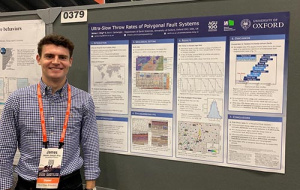AGU San Francisco
 Old Members’ Trust Graduate Conference and Academic Travel Fund Report – James King (DPhil Radcliffe Scholar in Earth Sciences)
Old Members’ Trust Graduate Conference and Academic Travel Fund Report – James King (DPhil Radcliffe Scholar in Earth Sciences)
In December 2019, I travelled to San Francisco to present my research at the American Geophysical Union (AGU) Fall Meeting. The AGU Fall Meeting is the largest international Earth and Space Science meeting in the world with an attendance of 25,000 delegates. The 2019 Fall Meeting marked AGU’s Centennial year and celebrated scientific progress over the last century, with an outlook to future challenges and breakthroughs that the next 100 years will bring. The conference had a real buzz with a vast array of presentations from climate science to earthquake hazards.
I presented my work on the growth rates of ‘Polygonal Fault Systems’, which are an enigmatic class of non-tectonic extensional faults that form exclusively in fine-grained sediments in basins around the world. ‘Polygonal Fault Systems’ have puzzled scientists since their discovery over three decades ago. The genesis and mechanism(s) that drive the growth of ‘Polygonal Fault Systems’ are widely debated and little is known about the temporal evolution of these widespread yet poorly understood geological phenomena. Over the course of my DPhil, I have investigated the growth rates of ‘Polygonal Fault Systems’ and found they grow extremely slowly, accumulating around 10 meters of vertical displacement every million years. This is up to three orders of magnitude slower than the fastest growing tectonic extensional faults recorded in the Corinth Rift, Greece. Understanding the spatial and temporal kinematics of ‘Polygonal Fault Systems’ has wide importance, especially when appraising the sealing integrity of regional caprocks for the geological storage of nuclear waste and CO2.
It was great to talk about my research to fellow structural geologists, and nice to know that fellow researchers are as excited about my work as I am. I also had the opportunity to meet a lot of inspiring scientists from a wide range of backgrounds and heard some excellent thought-provoking talks. Several friends from the Earth Sciences Department in Oxford were also presenting at the conference and it was nice to see their presentations and explore the ginormous conference centre together. I was lucky enough to get my hands on the coveted MatLab cap and some nice posters to re-decorate the office back in Oxford. Overall I had a fantastic time at AGU and thoroughly enjoyed the opportunity to present my research.
Whilst in San Francisco I took the opportunity to explore the city before heading home. On my final day I hired a bike and cycled 70 kilometres around the city, over the Golden Gate Bridge, and around the Marin Headlands. Outside of my research I am a keen cyclist, and to me there’s no better way to explore new places than by bike. Other San Franciscan highlights include a boat trip to visit Alcatraz, riding the Powell-Hyde cable car, and a selection of great cafes and restaurants.
Thank you to the Univ Old Members’ Trust for enabling me to present my research at the AGU Fall Meeting 2019. I would also like to thank my supervisors Prof Joe Cartwright and Prof Bruce Levell, Univ and the benefactors of the Oxford-Radcliffe scholarship for their generous support of my DPhil research.
Find out more about the range of travel grants and scholarships available to assist Univ students on our Travel Grants page or read further travel reports.
Published: 27 January 2020
Explore Univ on social media
